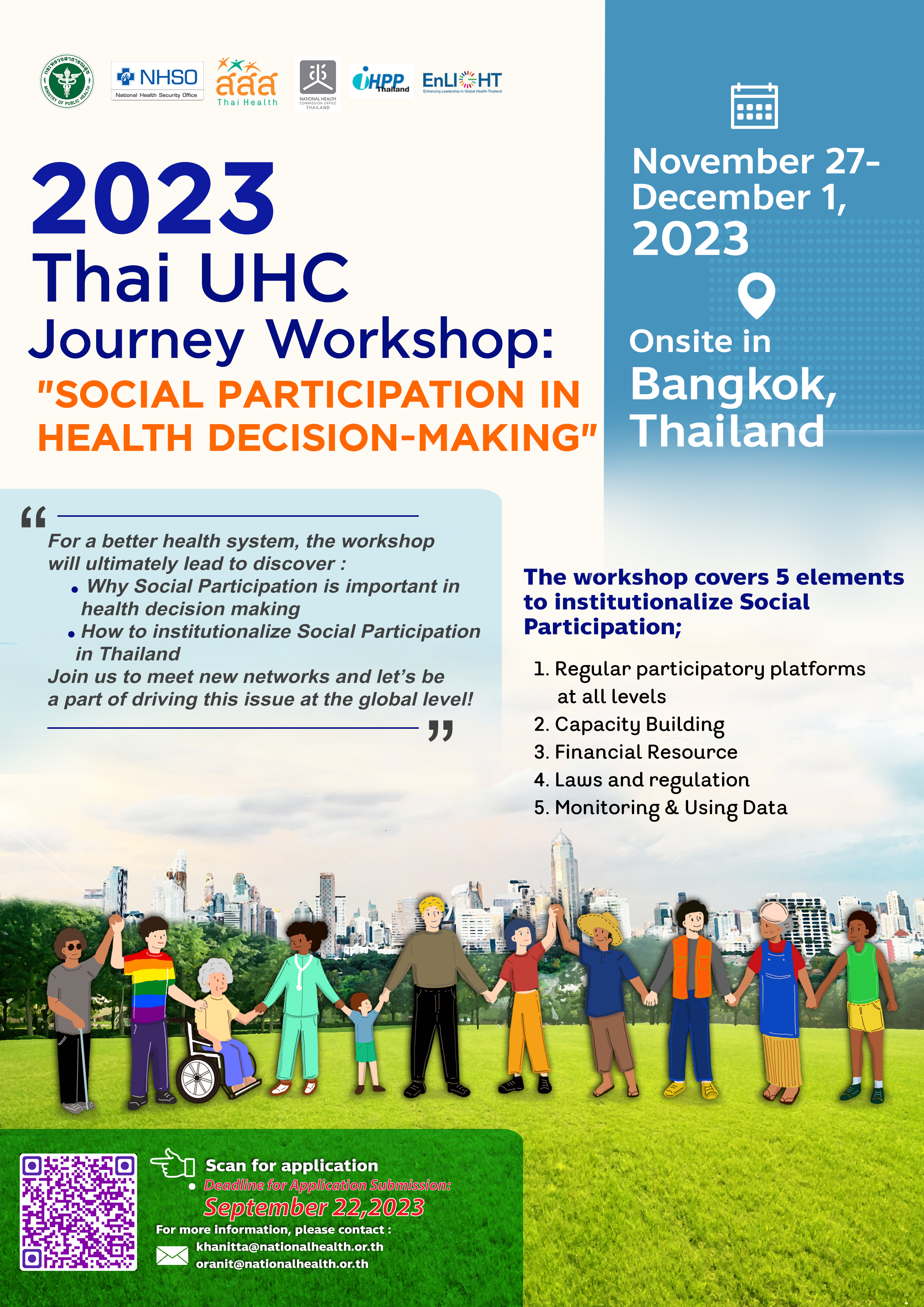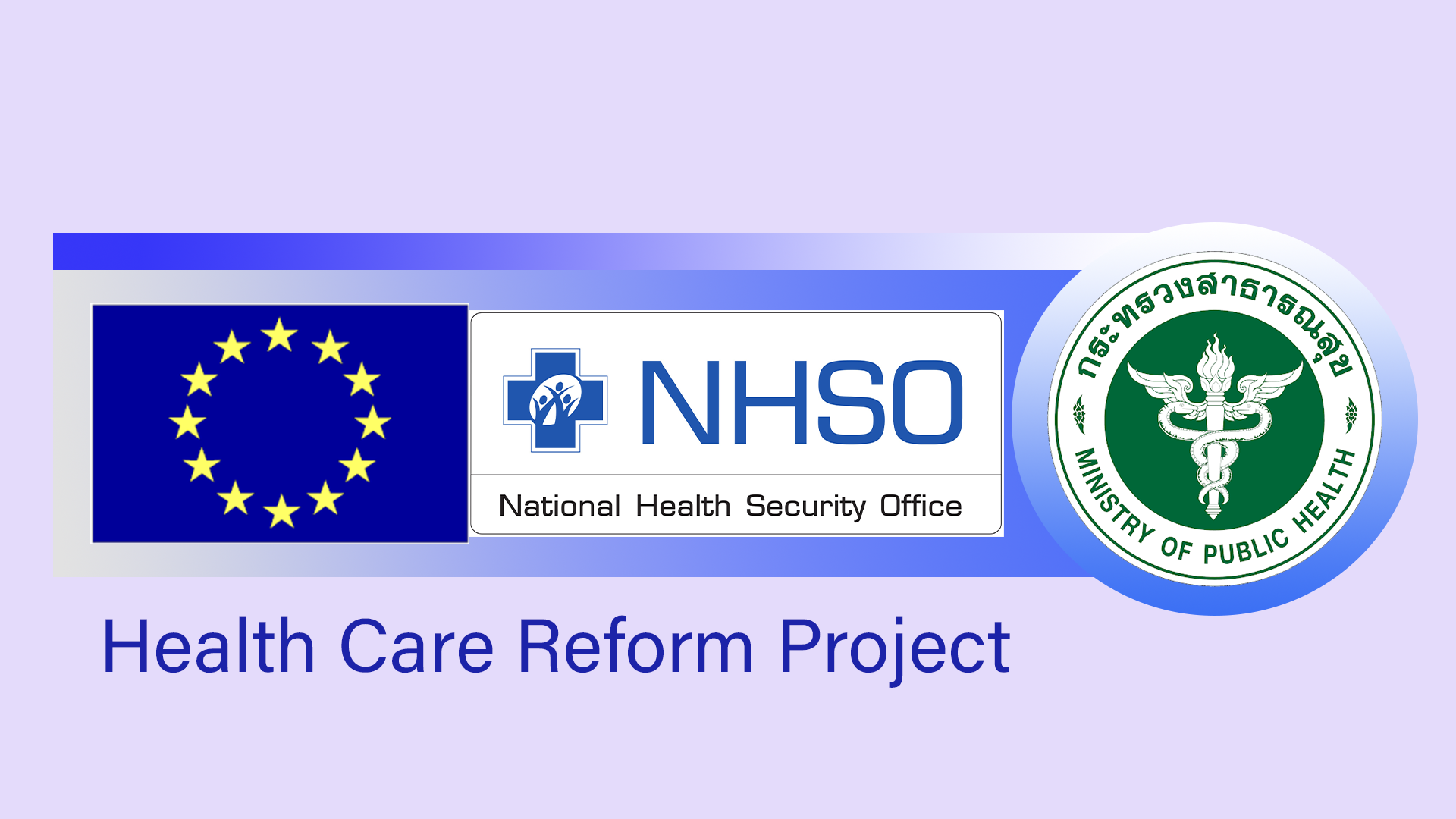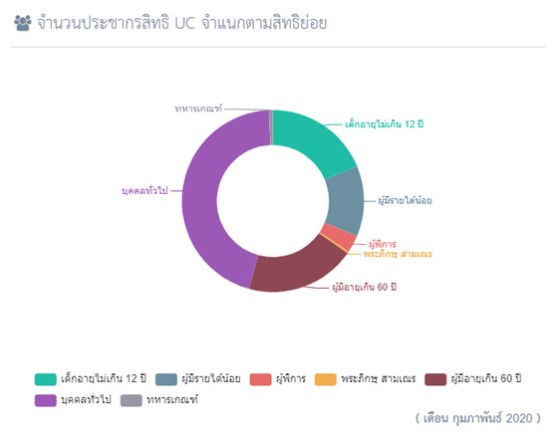Public participation needed to achieve UHC
.jpg)
29 Jan, 2020—Public participation is the key to achieve the Universal Healthcare Coverage (UHC)’s goal of leaving no one behind.
“None of any steps toward UHC had no people involved,” said Usawadee Sutapuk, a lecturer at Payap University’s Faculty of Pharmacy, who conducted a study on public participatory levels in Thailand's UHC.
“Participation is in every level of UHC development---from drafting UHC law to having civil society representing in its governing board. It’s developed into the level that people feel ownership over the scheme.
” She spoke at a Wednesday sideline meeting at Prince Mahidol Award Conference in Bangkok. Local civil society, consumer and patient groups launched a movement to call the Thai government to implement UHC in the late 1990s, after the implementation of the 1997 constitution that guarantees health access rights for the first time in Thai history.
Their movement pressured Phue Thai government to introduce UHC in 2002, covering more than 48 million Thai population currently. The rest of populations has been covered by two other schemes---social security scheme and civil service healthcare benefit.
“Thai civil society has a long history of fighting for healthcare access for all,” said Usawadee. “Despite Thailand’s success in UHC, the challenge remains. We need to achieve the goal of leaving no one behind under one standard health system.”
Attaporn Limpanyalert, Deputy Secretary of National Health Security Office (NHSO) overseeing UHC in Thailand, said that NHSO had put an effort in reaching to vulnerable groups such as inmates, stateless and indigenous people in the past year.
“Though most of Thai citizens are covered by one of each healthcare schemes, there’re some people left behind. We’ve tried to search for them and initiated the ways to include them in UHC.”
Ratna Devi, a board member of the International Alliance of Patients’ Organization, said that migrant is another vulnerable group needed to be considered. As they are on the move, they are often ignored by the healthcare system in both migrant-sending and -receiving countries.
“Most people talk about healthcare from the supply side---like the needs of more hospital facilities and the governments’ healthcare services in particular places. But I think we need to talk about healthcare from the demand side too---or from the patient side,” she said. “We are all patients at some points. So health is political choices, and the patients’ voices can influence politics.
Patients are valuable because they bring unique perspectives, expertise and experiences to healthcare system. They can actually inform us how to design a good healthcare system.” /end
………………..29 January 2020
IN DEPTH
Public participation needed to achieve UHC
.jpg)
29 Jan, 2020—Public participation is the key to achieve the Universal Healthcare Coverage (UHC)’s goal of leaving no one behind.
“None of any steps toward UHC had no people involved,” said Usawadee Sutapuk, a lecturer at Payap University’s Faculty of Pharmacy, who conducted a study on public participatory levels in Thailand's UHC.
“Participation is in every level of UHC development---from drafting UHC law to having civil society representing in its governing board. It’s developed into the level that people feel ownership over the scheme.
” She spoke at a Wednesday sideline meeting at Prince Mahidol Award Conference in Bangkok. Local civil society, consumer and patient groups launched a movement to call the Thai government to implement UHC in the late 1990s, after the implementation of the 1997 constitution that guarantees health access rights for the first time in Thai history.
Their movement pressured Phue Thai government to introduce UHC in 2002, covering more than 48 million Thai population currently. The rest of populations has been covered by two other schemes---social security scheme and civil service healthcare benefit.
“Thai civil society has a long history of fighting for healthcare access for all,” said Usawadee. “Despite Thailand’s success in UHC, the challenge remains. We need to achieve the goal of leaving no one behind under one standard health system.”
Attaporn Limpanyalert, Deputy Secretary of National Health Security Office (NHSO) overseeing UHC in Thailand, said that NHSO had put an effort in reaching to vulnerable groups such as inmates, stateless and indigenous people in the past year.
“Though most of Thai citizens are covered by one of each healthcare schemes, there’re some people left behind. We’ve tried to search for them and initiated the ways to include them in UHC.”
Ratna Devi, a board member of the International Alliance of Patients’ Organization, said that migrant is another vulnerable group needed to be considered. As they are on the move, they are often ignored by the healthcare system in both migrant-sending and -receiving countries.
“Most people talk about healthcare from the supply side---like the needs of more hospital facilities and the governments’ healthcare services in particular places. But I think we need to talk about healthcare from the demand side too---or from the patient side,” she said. “We are all patients at some points. So health is political choices, and the patients’ voices can influence politics.
Patients are valuable because they bring unique perspectives, expertise and experiences to healthcare system. They can actually inform us how to design a good healthcare system.” /end
………………..29 January 2020
Events
Public participation needed to achieve UHC
.jpg)
29 Jan, 2020—Public participation is the key to achieve the Universal Healthcare Coverage (UHC)’s goal of leaving no one behind.
“None of any steps toward UHC had no people involved,” said Usawadee Sutapuk, a lecturer at Payap University’s Faculty of Pharmacy, who conducted a study on public participatory levels in Thailand's UHC.
“Participation is in every level of UHC development---from drafting UHC law to having civil society representing in its governing board. It’s developed into the level that people feel ownership over the scheme.
” She spoke at a Wednesday sideline meeting at Prince Mahidol Award Conference in Bangkok. Local civil society, consumer and patient groups launched a movement to call the Thai government to implement UHC in the late 1990s, after the implementation of the 1997 constitution that guarantees health access rights for the first time in Thai history.
Their movement pressured Phue Thai government to introduce UHC in 2002, covering more than 48 million Thai population currently. The rest of populations has been covered by two other schemes---social security scheme and civil service healthcare benefit.
“Thai civil society has a long history of fighting for healthcare access for all,” said Usawadee. “Despite Thailand’s success in UHC, the challenge remains. We need to achieve the goal of leaving no one behind under one standard health system.”
Attaporn Limpanyalert, Deputy Secretary of National Health Security Office (NHSO) overseeing UHC in Thailand, said that NHSO had put an effort in reaching to vulnerable groups such as inmates, stateless and indigenous people in the past year.
“Though most of Thai citizens are covered by one of each healthcare schemes, there’re some people left behind. We’ve tried to search for them and initiated the ways to include them in UHC.”
Ratna Devi, a board member of the International Alliance of Patients’ Organization, said that migrant is another vulnerable group needed to be considered. As they are on the move, they are often ignored by the healthcare system in both migrant-sending and -receiving countries.
“Most people talk about healthcare from the supply side---like the needs of more hospital facilities and the governments’ healthcare services in particular places. But I think we need to talk about healthcare from the demand side too---or from the patient side,” she said. “We are all patients at some points. So health is political choices, and the patients’ voices can influence politics.
Patients are valuable because they bring unique perspectives, expertise and experiences to healthcare system. They can actually inform us how to design a good healthcare system.” /end
………………..29 January 2020
RESOURCE CENTER
SECRETARY-GENERAL
Public participation needed to achieve UHC
.jpg)
29 Jan, 2020—Public participation is the key to achieve the Universal Healthcare Coverage (UHC)’s goal of leaving no one behind.
“None of any steps toward UHC had no people involved,” said Usawadee Sutapuk, a lecturer at Payap University’s Faculty of Pharmacy, who conducted a study on public participatory levels in Thailand's UHC.
“Participation is in every level of UHC development---from drafting UHC law to having civil society representing in its governing board. It’s developed into the level that people feel ownership over the scheme.
” She spoke at a Wednesday sideline meeting at Prince Mahidol Award Conference in Bangkok. Local civil society, consumer and patient groups launched a movement to call the Thai government to implement UHC in the late 1990s, after the implementation of the 1997 constitution that guarantees health access rights for the first time in Thai history.
Their movement pressured Phue Thai government to introduce UHC in 2002, covering more than 48 million Thai population currently. The rest of populations has been covered by two other schemes---social security scheme and civil service healthcare benefit.
“Thai civil society has a long history of fighting for healthcare access for all,” said Usawadee. “Despite Thailand’s success in UHC, the challenge remains. We need to achieve the goal of leaving no one behind under one standard health system.”
Attaporn Limpanyalert, Deputy Secretary of National Health Security Office (NHSO) overseeing UHC in Thailand, said that NHSO had put an effort in reaching to vulnerable groups such as inmates, stateless and indigenous people in the past year.
“Though most of Thai citizens are covered by one of each healthcare schemes, there’re some people left behind. We’ve tried to search for them and initiated the ways to include them in UHC.”
Ratna Devi, a board member of the International Alliance of Patients’ Organization, said that migrant is another vulnerable group needed to be considered. As they are on the move, they are often ignored by the healthcare system in both migrant-sending and -receiving countries.
“Most people talk about healthcare from the supply side---like the needs of more hospital facilities and the governments’ healthcare services in particular places. But I think we need to talk about healthcare from the demand side too---or from the patient side,” she said. “We are all patients at some points. So health is political choices, and the patients’ voices can influence politics.
Patients are valuable because they bring unique perspectives, expertise and experiences to healthcare system. They can actually inform us how to design a good healthcare system.” /end
………………..29 January 2020
VIDEOS
Thailand's UHC Journey
UHC Public relations
















